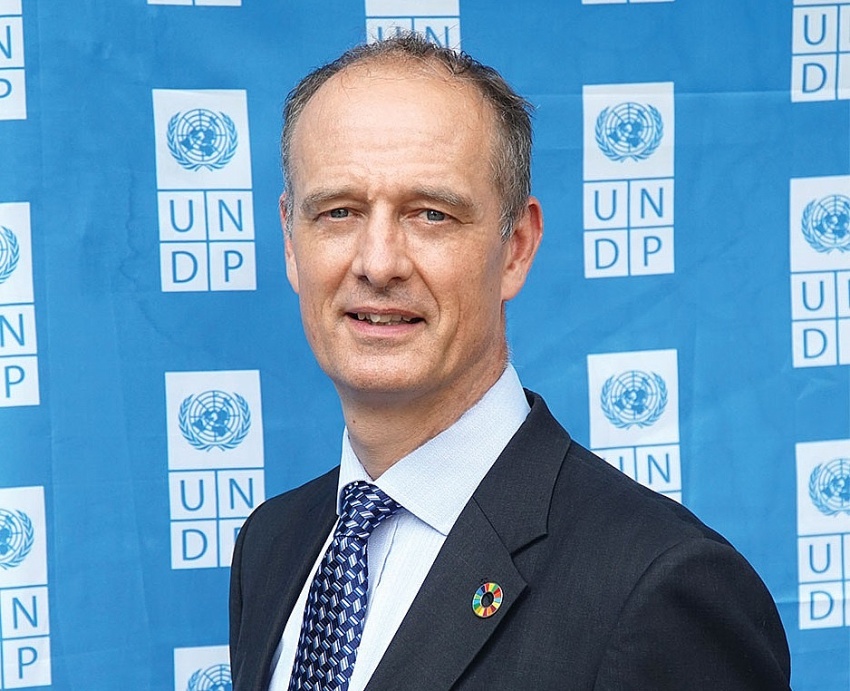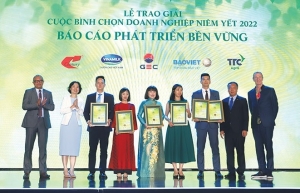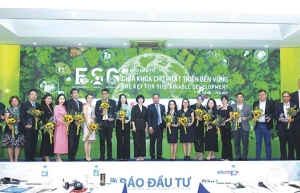The proactive pursuit of sustainability
How important is sustainable development to the Vietnamese economy and to the domestic business community?
We need to break down the concept of sustainable development. For the UN, we work with governments around the world to implement the Sustainable Development Goals (SDGs). These include all aspects of development, for people and the planet. The SDGs recognise that ending poverty and other deprivations must go hand-in-hand with strategies that improve health and education, reduce inequality, and spur economic growth – all while tackling climate change and working to preserve our oceans and forests.
 |
| Patrick Haverman, deputy resident representative of the United Nations Development Programme in Vietnam |
In the context of Vietnam, sustainable development needs to achieve the objectives of stimulating economic development and achieving an environmentally sustainable growth. For the domestic business community, support must be provided for them to deepen their capabilities to participate in global value chains. Global consumers are increasingly demanding for more sustainable production methods, greener packaging and logistics, and better working conditions.
There are several issues to be considered: capacity building, technology for cost-effective production, and market information. Each area requires a different set of interventions, and the Vietnamese government can support businesses through enabling policies that encourage sustainable business practices.
What opportunities and challenges are there for businesses to pursuit sustainable development?
There are numerous opportunities for businesses to pursuit sustainable development. These range from sustainable production methods, such as smart agriculture, water conservation, and use of renewable energy, to business ideas that help improve health and education services for people.
We have worked on an initiative called SDG investor mapping. This is essentially a map of potential investment opportunities that are both commercially viable and help deliver the SDGs. We have mapped this for Vietnam and hope to launch the results soon.
In terms of challenges, there are many. However, sometimes businesses are driven more by profit than the need to be sustainable. Being sustainable can sometimes be expensive for businesses. However, in the medium term, being sustainable will bring more opportunities, as global demand becomes more and more aware of the issue of sustainability, I would encourage businesses to factor sustainability into their bottom line.
The UNDP has been cooperating with the Vietnamese government and localities in deploying sustainable development activities including environmental, social, and governance (ESG) criteria. What experiences can you share?
Our work in Vietnam goes beyond ESG. Our activities all share a common objective: to help the Vietnamese government achieve Agenda 2030. We work across three main areas: deliver inclusive growth, increase participation and governance, and climate change. Throughout these three pillars, we integrate sustainability.
For example, with the support from the Canadian government, we work with MPI AED and social impact businesses to create jobs for vulnerable groups including women, people with disabilities, and ethnic minorities, or to develop products and services for these groups. With the support from the Swedish and Japanese government, we work with the Vietnam Chamber of Commerce and Industry (VCCI) to promote responsible businesses and human rights in Vietnam.
With support from the Green Climate Fund, we implement projects that promote smart agriculture, better water management, and nature-based solutions.
What is the upcoming sustainable development/ESG plan that the UNDP will continue to implement in Vietnam?
In addition to the aforementioned examples, we are actively supporting the Vietnamese government with the energy transition. We were pleased to cooperate with VIR in July this year on an important roundtable on financing and governance accelerators for this energy transition.
This is an important topic for the short term and the long term. For Vietnam to achieve net-zero carbon emissions as committed, the country needs to go beyond greening the energy sector. It needs to make sure that other industries are also becoming more sustainable. For example, transportation must be more energy efficient; construction needs to be using more sustainable materials and agriculture must be more regenerative. All sectors must work together.
Therefore, the role of the government is vital in coordinating and spearheading the sustainable initiative. The government is in a perfect position to create a consensus among sector ministries to join a common objective of sustainable development.
We have been supporting the Vietnamese government in implementing the SDGs. For us, sustainable development does not stay at the ESG level. In fact, sustainable development encompasses all aspects of peace and prosperity for people and the planet, ranging from poverty reduction and hunger alleviation to gender equality, clean energy, and biodiversity.
Within our work with businesses, since the Guiding Principles on Business and Human Rights were adopted by the UN human Rights Council in 2011, the UNDP has worked on business and human rights all over the world.
Currently, the UNDP in Vietnam has been supporting the government to develop a national action plan for business and human rights to promote responsible business in Vietnam. Along with the government’s direction, we offer guidance to businesses and other actors in Vietnam on how to meet their responsibilities to carry out a heightened version of human rights due diligence.
In 2019, the UNDP and the VCCI developed and launched a business integrity pledge for business associations. Through the pledge, business associations commit themselves to promote business integrity, act as role models of business integrity and encourage their members to comply with the 2018 anti-corruption law. Now, 15 large business associations have signed this pledge and are also supporting social impact businesses in a joint project with the Ministry of Planning and Investment, where we help strengthen the ecosystem of businesses, intermediaries, investors, and the government so that they can operate sustainably even after the project finishes.
 | Listed companies lean into ESG conventions The mounting acceleration of sustainability and ESG-related criteria have been among the major concerns among financial markets, and Vietnamese organisations are allocating more resources towards improving their resilience. |
 | Hospitality industry joins ESG Environmental, social, and governance criteria are still a new concept for most tourism and hotel businesses in Vietnam, but the success stories of a number of pioneering brands have contributed to inspiring businesses to embrace them more, with several companies picking up awards at a seminar organised by Vietnam Investment Review last week. |
 | Determination on show by businesses to be ESG ready Many businesses in Vietnam are advised to use environmental, social, and governance criteria as soon as possible as an effective tool for their sustainable development and improve their competitiveness. However, numerous challenges are facing them ahead. |
 | AEON Vietnam promoting sustainable consumption Building a sustainable distribution system and promoting sustainable consumption have become the key goals of Japanese retailer AEON Vietnam as a bridge between manufacturers and consumers. |
What the stars mean:
★ Poor ★ ★ Promising ★★★ Good ★★★★ Very good ★★★★★ Exceptional
Related Contents
Latest News
More News
- Citi economists project robust Vietnam economic growth in 2026 (February 14, 2026 | 18:00)
- Sustaining high growth must be balanced in stable manner (February 14, 2026 | 09:00)
- From 5G to 6G: how AI is shaping Vietnam’s path to digital leadership (February 13, 2026 | 10:59)
- Cooperation must align with Vietnam’s long-term ambitions (February 13, 2026 | 09:00)
- Need-to-know aspects ahead of AI law (February 13, 2026 | 08:00)
- Legalities to early operations for Vietnam’s IFC (February 11, 2026 | 12:17)
- Foreign-language trademarks gain traction in Vietnam (February 06, 2026 | 09:26)
- Offshore structuring and the Singapore holding route (February 02, 2026 | 10:39)
- Vietnam enters new development era: Russian scholar (January 25, 2026 | 10:08)
- 14th National Party Congress marks new era, expands Vietnam’s global role: Australian scholar (January 25, 2026 | 09:54)

 Tag:
Tag:



















 Mobile Version
Mobile Version